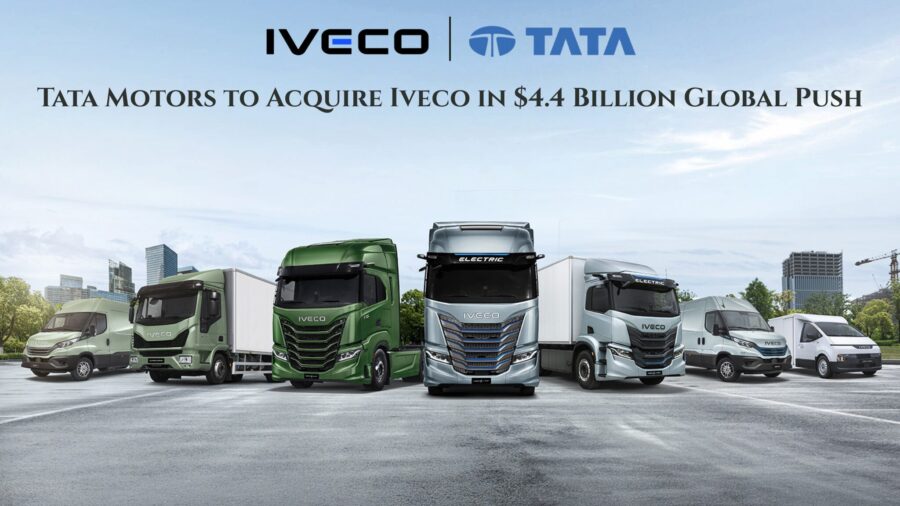4-Point Overview:
- Tata Motors is set to acquire Italy-based Iveco’s non-defense commercial vehicle business for $4.4 billion (₹38,240 crore).
- Iveco is Europe’s second-largest bus maker and holds an 11% CV market share across the EU and Latin America.
- The deal covers trucks, buses, powertrains, and financial services—excluding the defense arm.
- This is Tata’s second-largest acquisition after Jaguar Land Rover and will close by April 2026, pending approvals.
Intro:
Tata, known as India’s automotive giant, is now aiming to become a truly global force. In what’s being called a historic moment, Tata Motors is set to acquire Italian truck and commercial vehicle brand Iveco for a staggering $4.4 billion (approximately ₹38,240 crore). The strategic acquisition, expected to close by April 2026, includes all of Iveco’s non-defense operations—trucks, buses, powertrains, and even financial services.
This deal is more than just another business headline—it marks Tata’s bold step toward owning two powerful home bases: India and Europe. Let’s dive into what makes this acquisition monumental.
Tata’s Second-Biggest Global Leap
This deal becomes Tata Motors’ second-largest international acquisition, just behind the iconic Jaguar Land Rover buyout in 2008. But what makes it more special is that it taps into a massive commercial vehicle potential across borders—from urban buses in Europe to rugged powertrains in South America.
The acquisition includes:
- 100% ownership of Iveco’s trucks, buses, and powertrain divisions
- Financial services that support both customers and dealerships
- A direct channel into European and Latin American markets where Iveco enjoys an 11% CV market share
By bringing Iveco under its wing, Tata Motors gains infrastructure, IP, talent, and market access in one move.
What’s NOT Included?
The deal specifically excludes Iveco’s defense business, which will be acquired by Italy’s state-owned group Leonardo. This ensures Tata can maintain focus on mobility and transportation without venturing into defense complexities.
That means:
- The deal is cleaner and more focused.
- Tata can integrate Iveco’s business units faster without defense red tape.
- The acquisition directly aligns with Tata’s mobility-first strategy.
Strategic Voices Speak Out
Industry leaders from both sides are excited about what lies ahead:
- N. Chandrasekaran (Chairman, Tata Motors) called the acquisition a “logical next step” post the CV business demerger, envisioning Tata with “two strategic home markets”—India and Europe.
- Suzanne Heywood (Chairperson, Iveco Group) stated this union would secure employment and industrial stability.
- Girish Wagh (Executive Director, Tata Motors) highlighted the potential to accelerate product innovation and sustainable transport solutions.
This isn’t just a buy—it’s a visionary alignment of innovation, sustainability, and growth.
What Tata Gains: Market & Tech Muscle
Iveco brings more than just brands to the table. It’s a tech powerhouse in powertrains and mobility. Globally, Iveco:
- Is the second-largest bus manufacturer in Europe
- Ranks fifth in engine and powertrain manufacturing
- Has expertise in sustainable propulsion systems for agriculture, construction, and logistics sectors
In other words, Tata gains ready-to-roll technologies that complement India’s growing appetite for cleaner, more efficient commercial vehicles.
Summary Table:
| Key Element | Details |
|---|---|
| Deal Value | $4.4 Billion / ₹38,240 crore |
| Target | Iveco’s non-defense CV business |
| Market Presence | 11% CV share in EU & Latin America |
| Exclusions | Defense unit (to be acquired by Leonardo) |
| Tata’s Position | Second-biggest buyout after JLR |
| Completion Deadline | By April 2026 (subject to regulatory clearances) |
| Strategic Gain | Two home bases: India & Europe |
Conclusion:
With this acquisition, Tata Motors isn’t just expanding—it’s evolving. Taking the reins of Iveco means Tata inherits a ready-made global CV ecosystem, cutting-edge technology, and a stronghold in two powerhouse markets—Europe and Latin America.
But this deal is more than just business. It’s about vision. It’s about Tata reimagining what mobility can look like across continents—from the engineering hubs of Pune to the design legacy of Turin.
This isn’t a play for market share—it’s a strategic step toward global relevance, sustainability, and innovation.
So, what’s next? A bold new chapter where Tata isn’t just part of the future—it’s helping shape it.

